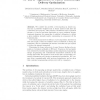Free Online Productivity Tools
i2Speak
i2Symbol
i2OCR
iTex2Img
iWeb2Print
iWeb2Shot
i2Type
iPdf2Split
iPdf2Merge
i2Bopomofo
i2Arabic
i2Style
i2Image
i2PDF
iLatex2Rtf
Sci2ools
130
click to vote
CONSTRAINTS
2011
2011
CP and IP approaches to cancer radiotherapy delivery optimization
Abstract. We consider the problem of decomposing an integer matrix into a positively weighted sum of binary matrices that have the consecutive-ones property. This problem is well-known and of practical relevance. It has an important application in cancer radiation therapy treatment planning: the sequencing of multileaf collimators to deliver a given radiation intensity matrix, representing (a component of) the treatment plan. Two criteria characterise the efficacy of a decomposition: the beam-on time (the length of time the radiation source is switched on during the treatment), and the cardinality (the number of machine set-ups required to deliver the planned treatment). Minimising the former is known to be easy. However finding a decomposition of minimal cardinality is NP-hard. Progress so far has largely been restricted to heuristic algorithms, mostly using linear programming, integer programming and combinatorial enumerative methods as the solving approaches. We present a novel mod...
Cancer Radiation Therapy | Communications | CONSTRAINTS 2011 | Integer Programming Formulations | Radiation Therapy Treatment |
| Added | 25 Aug 2011 |
| Updated | 25 Aug 2011 |
| Type | Journal |
| Year | 2011 |
| Where | CONSTRAINTS |
| Authors | Davaatseren Baatar, Natashia Boland, Sebastian Brand, Peter J. Stuckey |
Comments (0)

